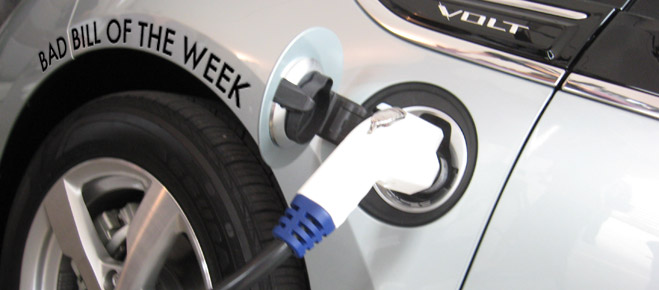
Remember the embarrassing Solyndra debacle perpetrated by the federal government? You would think that North Carolina lawmakers would have learned a lesson about the futility of granting government privileges to inefficient “green” energy schemes. Think again.
HB 1139, “Promote Renewable Jobs,” sponsored by Reps. Jennifer Weiss (D-Wake), Pricey Harrison (D-Guilford), Paul Luebke (D-Durham), and Chuck McGrady (R-Henderson), provides a tax break of 25 percent of the cost of providing facilities to produce components for electric vehicles, including “devices for energy storage, load management, metering, and energy recharging.” Investors can get the tax break three ways: build a new facility for manufacturing the components, expand an existing facility, or convert a facility by installing different equipment.
This legislation involves the government providing an unwarranted competitive advantage to politically-favored companies, rather than moving toward a fair economy in which all companies play by the same rules.
Moreover, tax incentives drive businesses to invest in areas that otherwise would not be profitable. Such market distortions cause scarce resources to be tied up in green boondoggles, and thus no longer available for more valued uses as determined by consumer preferences. Instead, productive capital flows to uses favored by politicians, which serves to centralize even more power into the hands of the political class.
Hybrid and electric automobiles are much more expensive than their gas-dependent counterparts. Being a strict, environmentally-conscious consumer is a heftier financial burden than most North Carolinians can bear in these harsh economic times. Only the wealthiest consumers can afford an electric car. Lower-income North Carolinians will be unable to replace their outdated vehicles with newer, more reliable models if gas-dependent car prices go up as a result of high demand and less competition. As with most government interventions into the market, they over-burden the average consumer.
Let consumers drive demand and let businesses respond to that demand. Obey the laws of the free market, and if the environmentalists are right about resource scarcity (and that’s a big “if”), then the cost of having a gas guzzling SUV or truck will eventually surpass the price of an electric car. Let the free market thrive, and both consumers and environmentalists may one day get what they want. And if environmentalists are wrong? Well, then, all that tax break money will have been wasted on making parts for shiny new cars that only the rich can afford.
For continuing to cram green legislation down the throats of North Carolina business investors and consumers, HB 1139 takes the cake for “Bad Bill of the Week”.



They never learn to leave the economy alone and let the consumers be the driving force. What is speaker Tillis’s opinion on this waste of taxpayer’s money to subsidies certain businesses?
Rep. Tillis voted in favor of Senate Bill 3 (Promote Renewable Energy) when it went to the House back in 2007. In fact, the bill only had nine dissenters in the House and one in the Senate. It seems that conservatives and liberals alike are somewhat unaware of the problems associated with “green” legislation. Conservatives think that it will promote jobs while liberals hope to help the environment when actually it is just a burden on businesses.
These political efforts to “facilitate” the capitalist system actually undermine it. There is no credible basis to claims that such tax breaks will pay for themselves. Rather, they support and prop up ill-conceived business models which are more likely to fail in the end, taking the public’s tax dollars with them.
You don’t get it. The environmentalists driving these experiments in control by college educated, intellectual elites are never wrong. It is the rest of us who “don’t get it.” The sky is falling and the proletariat are too helpless and ignorant to see into the dire future that awaits if these self appointed “futurists” don’t get their way. We, the everyday working folk, are in desperate need for their help to avert the disaster that awaits us. The poisoned air, polluted water and contaminated food, the rising seas, melting ice, mass animal extinctions, the death of the planet. The free market can’t be trusted. Government intervention, despite what the majority of the populace thinks, feels or suffers economically. No matter. The planet must be saved.
A college education is a wonderful thing providing most who graduate with the knowledge and skills to succeed in a free market, capitalist society but it also provides fertile ground for ideologues and zealots who thrive on controversy; non-conformists who believe that conventional wisdom, confronted, disputed, refuted by agenda driven “science” and turned into a national crusade culminating in a surreptitious acquisition of power, is the ultimate badge of success.
This is the Green movement and the politicians who’ve been sold on the premise that government is the only solution to the problem of what they perceive as public ignorance. Conventional wisdom, based on the American experiment, the most successful if yet imperfect system of societal organization, individual freedom, the natural competitive forces of the free market, capitalism, entrepreneurism with limited, targeted government interference continues to be challenged and continues to prove itself superior to every attempt at “improvement.”
The Obama administration represents the latest and one of the most aggressive efforts to effect change, a disaster in the making. That many continue to support it and applaud it should have those of us who see it clearly for the pending national and international calamity that awaits if he is reelected in November, should have us all more than a bit concerned.
NC has already had a “solyndra” of it’s own. Only a couple of years ago the was a bio diesel company around Laurinburg that received millions of federal dollars as well as millions in incentives from the state. The business ran one batch, decided that the corn prices were too high and closed down and took the tax dollars with them.